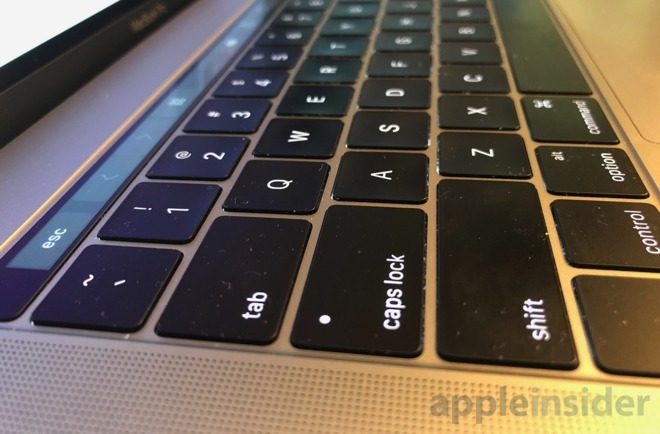Apple on Monday was denied a motion to dismiss a class action lawsuit leveled by MacBook owners who claim the company was not only aware of a flaw in the design of its butterfly keyboard, but took steps to conceal that fact from potential buyers.
U.S. District Judge Edward Davila in an order handed down in San Jose, Calif., today said Apple failed to present convincing arguments in its bid to toss claims of the case lodged in May.
Plaintiffs leveled multiple claims involving various MacBook models manufactured from 2015 and MacBook Pro models produced from 2016 which rely on Apple's butterfly keyboard mechanism. The ultra low-profile switch is advertised as more responsive and robust than traditional scissor-type counterparts, but a small portion of users found the vital component fails during regular use.
As noted in the suit, Apple's butterfly keyboard can in some cases succumb to small amounts of dust or debris, which impede normal switch behavior and cause keystrokes to go unregistered. Other issues with the key design include repeating characters, unresponsive key input and "sticky" keys. The company was allegedly aware of the flaw, but continued to sell the claimed faulty MacBooks at customers' peril, plaintiffs claim.
In its motion to dismiss, Apple said it presented owners with viable options to remedy the problem, including a variety of at-home troubleshooting methods and a repair program initiated in 2018. Earlier this year, Apple extended program eligibility to include 2018 MacBook Pro models
"The Program is an appropriate remedy under the CLRA because Plaintiffs can have their keyboards fixed free of charge and/or receive a refund for repair expenses if Plaintiffs paid to have their keyboards repaired," Apple argued.
Plaintiffs, however, note the voluntary program is ineffective because it fails to address the core issue. Further, faulty keyboards are replaced with parts bearing an identical design, leaving the door open for failure. Apple also does not compensate owners for out-of-pocket expenses during the repair process.
Reuters reported on the order earlier today.
Apple appears to be moving away from butterfly switches, as the company's latest 16-inch MacBook Pro ditches the slim profile keys in favor of a more traditional scissor type design. Whether the kerfuffle over butterfly keys prompted the shift is unclear.
Plaintiffs in the case seek damages, legal fees and demand Apple publicly disclose the keyboard design as flawed. In addition to damages, the suit calls on Apple to fix or replace defective units, with the latter demand covering reimbursement for the purchase of replacement laptops.
 Mikey Campbell
Mikey Campbell




-xl-m.jpg)


-m.jpg)






 Malcolm Owen
Malcolm Owen
 William Gallagher
William Gallagher
 Mike Wuerthele
Mike Wuerthele


 Thomas Sibilly
Thomas Sibilly
 Wesley Hilliard
Wesley Hilliard
 Marko Zivkovic
Marko Zivkovic








56 Comments
Oh jeez... here we go again...
The actual data says otherwise. The failure rate was within norms. As usual the internet amplifies the negative. The keyboards were not defective. That people detested them, constantly bitched about them, does not make them defective. These lawsuits benefit only the lawyers and that’s why they get filed. The plaintiffs claiming they were damaged by Apple will get diddly-squat as usual. They will NOT get the free 16” MBP they are expecting.
I'd agree with this if the mechanism itself was faulty, in that it stopped working or broke. But my understanding is that debris interfered with the mechanism instead? Apple has been proactive about addressing that, which is all that can be asked. They are not abandoning the design, but brought back the scissor in the meantime while they continue their research and development on a superior mechanism that many people are happy with.
Stop eating over your keyboards, people! Even my 2013 MacBook Air scissor keyboard doesn't handle crumbs well! I recently learned how to pry the keys off (very easy!) and it was amazing what was under them. No, I'm not pristine and perfectly clean in my daily computing. 16 hours a day hacking away at the keyboard sometimes involves eating at some point. :D
i for one will be interested to see the internal comms disclosed regarding the matter.
sadly i feel it will show that the company was well aware and did continue to sell and promote; however i doubt it will show the overall design to be defective, rather not ideal for real world usage.